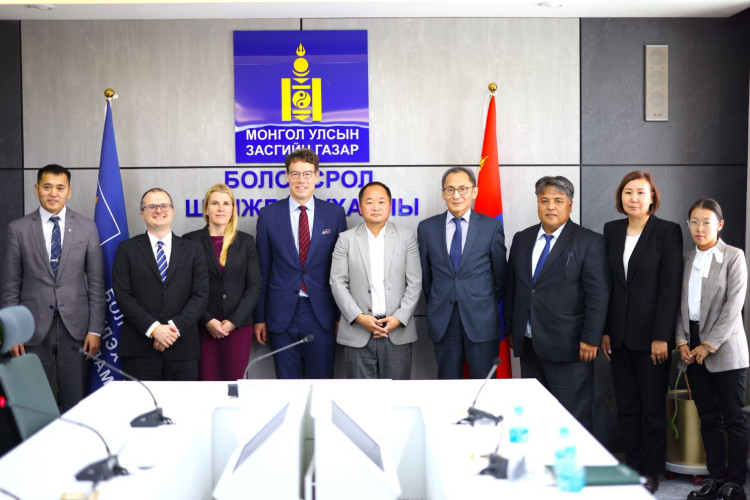The IAEA conducted a mission to Ulaanbaatar in June, upon request by the Government of Mongolia, to advise on the significance and benefits of the country's adherence to four international legal instruments: the Convention on Nuclear Safety; the Joint Convention on the Safety of Spent Fuel Management and the Safety of Radioactive Waste Management; the 2005 Amendment to the Convention on the Physical Protection of Nuclear Material; and the Modified Small Quantities Protocol.
"Further to the Policy of Mongolia on Radioactive Minerals and Nuclear Energy, we are continuing to develop the nuclear energy sector. At the same time, we also recognize the importance of joining the relevant international legal instruments and strengthening our national legal framework," said L. Enkh-Amgalan, Minister of Education and Science, and Head of the Nuclear Energy Commission.
The event, which took place from 26 to 30 June, was jointly organized by the Ministry of Foreign Affairs, the Ministry of Education and Science, the Executive Office of the Nuclear Energy Commission and the IAEA Office of Legal Affairs together with the IAEA Department of Nuclear Safety and Security, and the Department of Safeguards.
Massimo Aparo, Deputy Director General of the IAEA, Head of the Department of Safeguards, elaborated on the objective of the meeting. "The reason why we are gathered here today is, in essence, to recognize Mongolia's leadership in nuclear non-proliferation and disarmament, as well as in advancing nuclear safety and security efforts worldwide and, in this connection, to support Mongolia's endeavour to further strengthen its standing by joining four key instruments in the field of nuclear safety, security and safeguards, while considering related amendments to its own legal framework," he said. "Mongolia has been a member of the IAEA since 1973. Over these five decades, Mongolia has actively worked with the Agency to benefit from the many peaceful applications of nuclear technologies."
A total of 150 representatives from 65 organizations participated in the event, which consisted of five parts: bilateral ministerial level meetings; a high-level conference for key decision makers; a national consultation to promote adherence to the instruments; a bilateral meeting with civil society organizations and researchers to discuss the importance of the instruments; and a bilateral meeting on the draft amendments to the national Nuclear Energy Law.
Cristian De Francia, IAEA Legal Officer, said, "It is a unique opportunity to ask all the questions that you have to the IAEA team, and by doing so, we will also be strengthening our collaboration and paving the way for an even greater contribution by Mongolia to a safer and more secure world."
During the discussions, the IAEA team met with decision makers, governmental organizations, researchers, and civil society representatives. The experts provided clarifications on issues to support the country's efforts to join the instruments and the involvement of civil society during the process. They provided a comprehensive overview of the instruments, as well as the benefits of joining them and the procedural steps for the accession process. In addition, the IAEA team also discussed the main elements of a comprehensive nuclear law and the experiences of Member States. The IAEA Legislative Assistance Programme and IAEA advisory services and missions, as well as the benefits for Member States in receiving these services, were highlighted.
"This mission was an important activity, which has contributed one step forward in the process of joining these international legal instruments," said Manlaijav Gunaajav, the Secretary of the Nuclear Energy Commission and Head of the Executive Office.
This event was implemented under the IAEA Legislative Assistance Programme within the framework of regional Technical Cooperation Project RAS0090, entitled 'Establishing and Enhancing National Nuclear Legal Frameworks.' This event was also conducted with the support of the Peaceful Uses Initiative (PUI) Fund and the Nuclear Security Fund by the United States of America, as well as funding from the European Union for the strengthening of States' Systems of Accounting for and Control of Nuclear Material (SSAC) through training. This event was also implemented with extrabudgetary funds provided by the United States of America under the project "Promote and Enhance Implementation of the Legal Instruments Relevant to Radioactive Waste and Sources".
Further to the Policy of Mongolia on Radioactive Minerals and Nuclear Energy, we are continuing to develop the nuclear energy sector. At the same time, we also recognize the importance of joining the relevant international legal instruments and strengthening our national legal framework

The event was jointly organized by the Ministry of Foreign Affairs, the Ministry of Education and Science, the Executive Office of the Nuclear Energy Commission and the IAEA Office of Legal Affairs together with the IAEA Department of Nuclear Safety and Security, and the Department of Safeguards. (Photo: B. Granato de Souza/IAEA)






